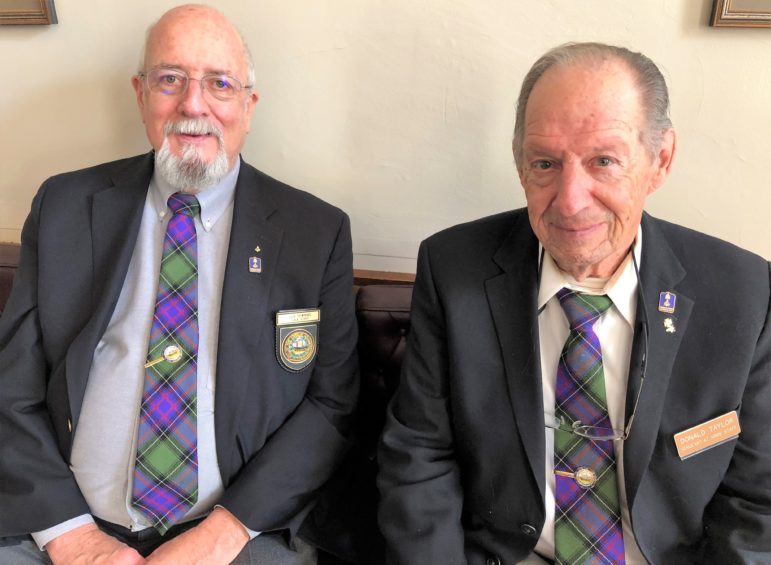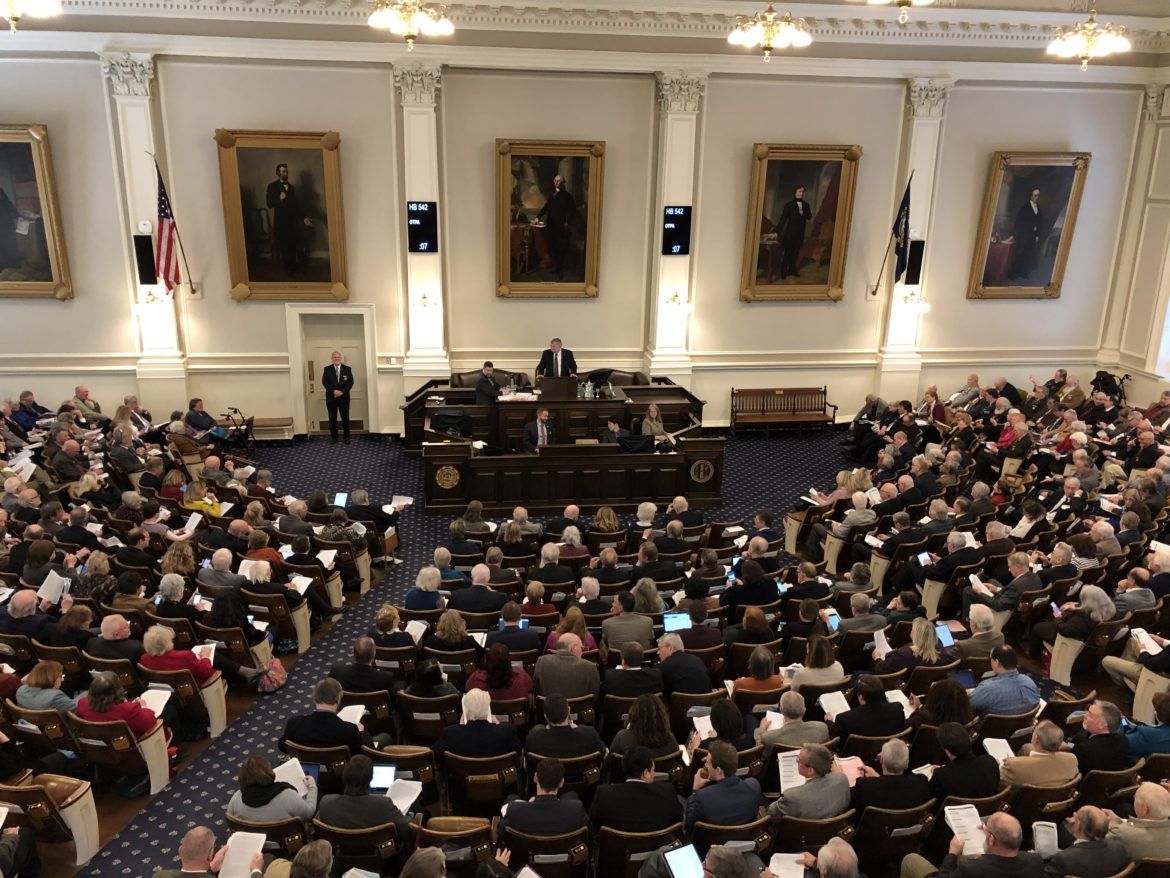Sign up for our free newsletter here.
By PAULA TRACY, InDepthNH.org
CONCORD – Up against Thursday’s deadline to move bills on to their next committee assignments, members of the House of Representatives voted on more than 20 bills including halting reductions in the business profits and enterprise tax.
Halting tax reductions
House Bill 623 as amended passed 200-141.
It has caused a partisan battle over the business profits and enterprise tax rate reductions that went into effect Jan. 1 with further reductions next year.
The bill with House Ways and Means Committee Chair Susan Almy, D-Lebanon as the prime sponsor originally would have returned the two business tax rates to what they were before lawmakers began reducing the rates as part of the 2016-17 biennial budget.
Republicans have been dead set against ending the rate reductions.
Republican Gov. Chris, Sununu would not say he would veto the budget if the tax rates were changed and said instead last week that “it is a hypothetical” at this point in the budget process.
“My priority is not to raise any taxes,” he said. “The tax cuts worked. We have the most robust economy in New England. Why turn away and go in the opposite direction?”
Former Gov. Maggie Hassan vetoed the 2016-17 budget over several issues, one of them the rate reductions, which she claimed would blow an $80 million hole in future budgets.
On Thursday, Almy said the revenue increases realized now are not due to the rate cuts. They came before the change, she said, to some jeers from House members.
If there is a recession, Almy said that would be troubling.
“That is why we need to stop the bleeding now,” Almy said.
Speaking to kill the bill, state Rep. Alan Bershtein, R-Nottingham, said it inhibits job creation and investment and seems arbitrary. If there is a recession it would make it worse. Raising taxes is bad policy in a recession, he said.
“This one’s an easy call – ITL (Inexpedient to Legislate),” he said to some applause.
Prior to Thursday’s vote, Almy echoed Hassan’s concerns.
“Relatively small changes in tax rates are much less important to businesses than workforce issues (training and basic education, physical and mental health and addiction, housing, workforce renewal in an aging population), transportation, energy costs, client-friendly permitting, quality of life and a functioning legal system,” Almy writes. “Most of these areas are ones that the state plays an important role in, and that we have been progressively underfunding for years.”
When the Senate has the bill, it is likely to do away with future rate reductions and leave the current rates in place.
The Ways and Means Committee approved the bill on a partisan 12-7 vote.

More on taxes
House Bill 686, which would extend the 5 percent interest and dividends tax to capital gains, while increasing the threshold for paying the levy passed on a vote of 199-143 on a roll call vote.
Rep. Patrick Abrami, R-Stratham, opposed the measure.
“This state, since its founding has never had a capital gains tax,” Abrami said. “This is an attack on business creation.”
An attempt to table the bill was defeated 130-203.
The bill would also increase the state per-pupil adequate education grant from $3,636 to $4,000 and would increase per-pupil aid for students on the free or reduced lunch program, and English-as-a-second-language and special education students.
The Ways and Means Committee recommended passage.
Rep. Joelle Martin, D-Milford, said the bill offers solutions for property tax relief and public school funding.
“This is a tax cut bill,” Martin said.
Independent Redistricting
The House voted 218-123 to establish an independent redistricting commission, eliminating a partisan redistricting process known as “gerrymandering.”
House Bill 706 as amended was advocated by state Rep. Judith Spang, D-Durham, who noted that New Hampshire is a “purple state.” She said creating a commission would be a “belt and suspenders” approach to ensure that politics don’t play a role in creating new districts.
Guns in schools
The House voted to lay on the table a bill that would regulate the possession of a firearm on school property. The vote to table was 232-109 on House Bill 101.
A measure that would remove the legal authority of a law enforcement officer to use deadly force in effecting an arrest, House Bill 218, was killed on a vote of 277-62.
Rep. Renny Cushing, D-Hampton, said: “Our current law works.”
House Bill 491 as amended was killed on a voice vote. The bill was an attempt to clarify that failure to answer a request by a peace officer to identify oneself is not grounds for arrest.
Supervised Visitation Centers
House Bill 565 passed 244-92. It would direct the state Health and Human Services department to seek requests for proposals on supervised visitation centers. It aims to protect children and others from those charged with domestic violence.
Changing Time Zones
House Bill 567, which would move New Hampshire into the Atlantic Time Zone, essentially making daylight savings time permanent, was approved 208-128.
The bill indicates that the change of time zone would be triggered if Maine and Massachusetts go for Atlantic time.
Killed bills
A number of measures did not pass muster and are gone for this legislative session.
House Bill 290, which would require the removal of certain wood stoves upon the sale of property, was killed 201-131.
House Bill 232, which would have established the New Hampshire anti-sanctuary act was killed on a roll call vote of 211-132. It would have required local and state governments to comply with federal law on immigrants.
A measure offering enabling legislation for communities to give elders, disabled and veterans a break on auto registration fees, House Bill 579, was killed 294-51.
House Bill 581-FN-L, which would prohibit tax funds from being used to pay membership dues to any professional association was killed 252-94.
House Bill 254, relative to the provision allowing operators to retain a portion of meals and rooms taxes collected and the appropriation of meals and rooms tax revenues to school building aid failed on a voice vote.
House Bill 609-FN, relative to the criminal penalty for the possession and distribution of child erotica, was killed on a voice vote.
House Bill 569-FN-L was killed. It would have permitted a school district to develop a plan for becoming an innovative school. The vote was 200-131.
House Bill 547, relative to the licensure for respiratory care was killed.
House Bill 152 was killed on a vote of 197-124. It would increase the threshold for reporting for political parties.
House Bill 505, which would allow for approval voting in New Hampshire was killed on a vote of 305-22. This is not ranked choice voting and no state has ever adopted it. It was opposed unanimously in committee.
House Bill 720 relative to the part-time employment of retired community college system faculty was killed.
More passed bills
A measure that would appropriate $500,000 for the boat ramp and parking lot improvements at Lake Sunapee State Beach and offer the lease of the Wild Goose site. House Bill 727, passed on a voice vote as amended.
The “Pollyanna Bill,” House Bill 572, passed on a voice vote. It makes the second Saturday in June Pollyanna Day in the state in honor of the cheerful, optimistic book character. Eleanor H. Potter of Littleton was the author.
House Bill 542, which would create a grant program to update municipal wetlands regulations, passed 208-140.
House Bill 557, which would establish a fund for dredging in the seacoast passed 325-18.
HB 625-FN, which requires motor boats to have a $20 decal to deal with aquatic invasive species passed on voice vote.
At the request of Fish and Game, House Bill 630 increases fines on OHRV and snowmobiles for various infractions, passed on a voice vote.
A bill that would create a water resources fund within the state’s Wetlands Division, House Bill 682, passed 201-147. The fund would help expedite permitting but would increase fees.
House Bill 641-L OTP as amended, passed 194-151. It would allow a $2 hotel room fee to be collected by municipalities to create a fund to support tourism and/or redevelopment.
The measure, like the others that passed and have a fiscal impact head on to House Finance Committee and will come back for a full House vote.
A bill that establishes a committee to study teacher preparation and education, House Bill 258, passed 194-145.
House Bill 226, which would reduce the probationary period for teachers from five to three years passed with an amendment on a vote of 200-128.
House Bill 476, replacing the milk producers’ emergency relief fund with a dairy premium fund passed on a voice vote.
House Bill 634 establishing a commission on foraging mushrooms passed.
House Bill 289 was laid on the table. It would repeal a provision permitting public school districts to authorize the recitation of the Lord’s Prayer.
– Garry Rayno contributed to this report.
InDepthNH.org is New Hampshire’s only statewide, online nonprofit news outlet.





